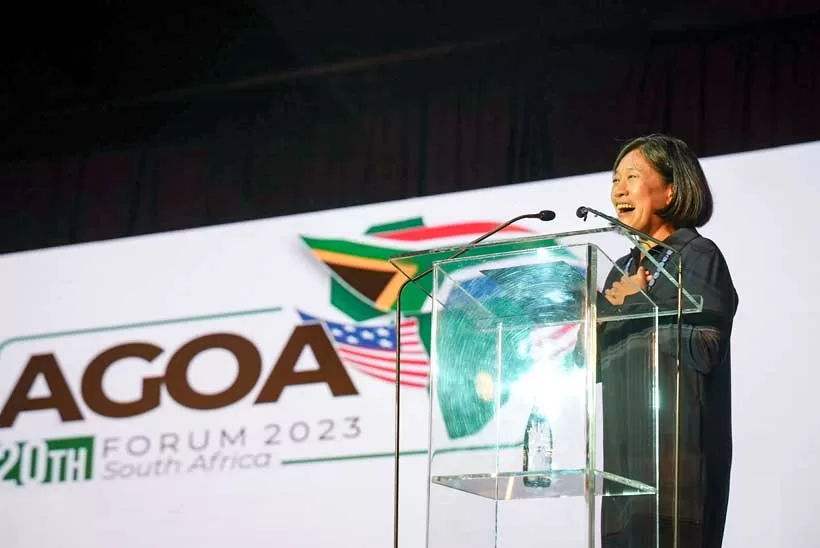“AGOA has been the cornerstone of our economic partnership with sub-Saharan Africa for over twenty years,” said Ambassador Tai. “This Forum is an opportunity to discuss how we can make the program more effective, to address today’s challenges and deliver real benefits to more people across the continent. I look forward to welcoming my fellow ministers and guests to Washington.”
The theme for July’s AGOA Forum is “Beyond 2025: Reimagining AGOA for an Inclusive, Sustainable and Prosperous Tomorrow.” Over the course of the event, participants will engage in discussions on how the United States and sub-Saharan African partners can work together to make AGOA more transformative and ensure that the program can be an effective tool to drive inclusive, sustainable economic growth for more people and advance regional integration efforts.
The expectation is that the AGOA Forum will bring together the governments of the United States and AGOA-eligible countries, as well as representatives from key regional economic organizations, civil society, labor, and the private sector. The July 25 to 26 Ministerial program will feature plenary sessions on the present and future of AGOA and U.S.–Africa trade and investment cooperation, as well as breakout sessions on various topics. It will be preceded on July 24 by a Civil Society and Organized Labor Forum and a Private Sector Forum.
The Corporate Council on Africa (CCA) is the leading U.S. business association focused solely on connecting business interests in Africa. In 2023, CCA organized a business summit which was a tremendous success in Botswana, southern Africa. The participants – most importantly – private sector corporate executives looked at Africa and the United States engaging in strategic dialogue on the key issues and opportunities driving U.S.-Africa trade, investment, and commercial engagement.
Remittance flows is definitely one of the surest reliable sources of foreign exchange, depending solely on the dollar currency, to support trade. In its latest report in June, the World Bank indicated that, despite the geopolitical uncertainties, instability and challenges, sub-Saharan Africa’s remittance flow reached $54 billion in 2023.
These funds play a crucial role in stabilizing trade and consequently the economic subsistence in the region that has been exacerbated by global geopolitical tensions, including the Russian invasion of neighbouring Ukraine and the Israel-Gaza conflict. Looking ahead for ensuring the trade between the United States and Africa therefore requires reviewing measures such as trade policy, trade facilitation, productive capacity, trade-related infrastructure, trade finance, trade information and factor-market integration.
Discussions over the reauthorization of the African Growth and Opportunity Act (AGOA), a cornerstone of U.S. efforts to cultivate deeper economic relations with sub-Saharan Africa, allowing countries there export certain products to the U.S. duty-free. Last July, the Biden administration reported facilitating more than 900 deals across 47 African countries since 2021, for an estimated $22 billion in two-way trade and investment. Also, the U.S. private sector sealed investment deals exceeding $8.6 billion.
Last year for instance, U.S. Trade Representative Katherine Tai told the gathering there about the necessity to establish more investment, in addition to market access. The duty-free access for nearly 40 African countries has boosted development, fostered more equitable and sustainable growth in Africa. The AGOA offered promise as a “stepping stone to address regional and global challenges” with Africa’s young and entrepreneurial population. The future is Africa, and engaging with this continent is the key to prosperity for United States and Africa, according to Katherine Tai.
Since its enactment in 2000, the African Growth and Opportunity Act (AGOA) has been at the core of United States economic policy and commercial engagement with Africa. AGOA provides eligible sub-Saharan African countries with duty-free access to the U.S. market for over 1,800 products, in addition to the more than 5,000 products that are eligible for duty-free access under the Generalized System of Preferences program.
To meet AGOA’s rigorous eligibility requirements, countries must establish or make continual progress toward establishing, among other things: a market-based economy; the rule of law, political pluralism, and the right to due process; the elimination of barriers to U.S. trade and investment; economic policies to reduce poverty; a system to combat corruption and bribery; and protection of internationally recognized worker rights.
To be eligible, countries also must not engage in gross violations of internationally recognized human rights. By providing new market opportunities, AGOA has helped bolster economic growth, promoted economic and political reform, and improved U.S. economic relations in the region.
Over the years, African leaders have been engaging with their diaspora, especially those excelling in sports, academia, business, science, technology, engineering and other significant fields that the continent needs to optimize its diverse potentials and to meet development priorities. These professionals primarily leverage into various sectors, act as bridges between the United States and Africa. President Joe Biden has also created the African Diaspora Advisory Council as part of the presidency. It has been working closely together to deepen and fortify America’s strategic partnerships with African diaspora, and in the interests of sustaining a meaningful stability between Africa and the United States.
